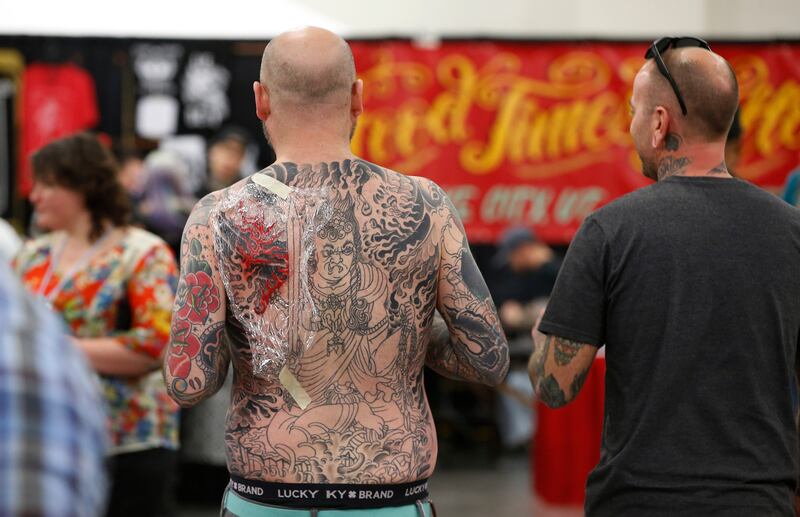SALT LAKE CITY — CJ Fishburn has nothing against tattoos; three-quarters of his body is etched in ink. He is writing a book about the history of tattoos, and he’s been a tattoo artist for 16 years. Just don’t ask him to put one on your face.
Fishburn, 36, is among tattoo artists who decline to do facial art, saying they have a moral obligation to turn down these requests because of potential social consequences. But the requests are coming more frequently these days, thanks to celebrities who post their facial tattoos on Instagram and other forms of social media.
Most recently, Presley Gerber, the 20-year-old son of supermodel Cindy Crawford, had the word “MISUNDERSTOOD” tattooed under his eye. Other celebrities with face tattoos include Chris Brown, Justin Bieber, Amber Rose and Utah-based hip-hop artist Post Malone. Rapper Jayceon Terrell Taylor, who goes by “The Game,” had Kobe Bryant’s signature tattooed on his face after the basketball star’s death.
But face tattoos remain rare among noncelebrities, in part because artists are reluctant to do them because they’ve witnessed regret in those who have them.
“In my experience, most people I know who have face tattoos, or even neck and hand tattoos, generally wish they didn’t have them,” said Jason Sara, an artist at Yellow Rose Tattoo in Salt Lake City.
More bluntly, New York City tattooist Carlos Delgado told Kirsten Fleming of the New York Post, “It’s not my job to ruin somebody’s life.”
With the International Tattoo Convention taking place in Salt Lake City Feb. 21-23, artists from around the world will be demonstrating their talent at the Salt Palace. Here’s why many of the best will only work from the neck down.

Outside the norm
Fishburn, who works at Look Look in Sugar House, said that face tattoos have a long and rich history; our ancient ancestors used them to identify their tribes. Later, facial markings showed a person’s status in society and was a way of identifying criminals, or showing gang membership. Today, tattoos remain an “x” mark, “an out-of-society mark” that signifies the tattooed person does not wish to conform to societal norms, he said.
It may seem ironic, then, that tattoos are becoming more accepted, driven in part by celebrities showing theirs off on social media. More than one-quarter of Americans have at least one tattoo, and researchers at Baylor University in Texas recently found that one-fifth of tattoos on that campus are symbols of religious faith. That said, many churches still discourage the practice, citing a line in Leviticus that says people should not cut or tattoo their bodies.
The U.S. Armed Forces, facing up to estimates that nearly half of millennials have tattoos, have relaxed their policies about body art in recent years, but all branches of the service still prohibit tattoos on faces.
“I don’t think face tattoos will ever be acceptable the way other tattoos are,” Fishburn said. This is why his motto is, “Give people what they want, not what they ask for.”
“Honestly, people do not know what they’re getting into,” he said.
Unlike tattoos elsewhere on the body, facial tattoos can’t be covered up with clothing, and makeup is only so effective. And even people who make their living giving people tattoos acknowledge that a stigma exists.
“Being visibly tattooed does change the way people treat you, whether people want to believe that or not. You will be looked at differently. And it is something that still can hold people back,” Sara said.
“You get on the internet and see these people who are heavily tattooed, and you think they live totally normal lives and (celebrities) probably do, but that’s not true for everyone if you tattoo your face.”
A long game
With just the word “MISUNDERSTOOD” tattooed on his face, and a supermodel mom, Gerber can afford to skirt societal norms at age 20. But job discrimination is real for people with facial tattoos, tattoo artists say, so much so that these tattoos are sometimes called “jobstoppers.” This is why Delgado, in Manhattan, told the New York Post “I have a moral obligation to educate people before they get one.”
Russ Quinn, the owner of Divine Tattoo Parlor in Kansas City, recently undertook tattoo removal as a form of ministry. He is donating his time to remove multiple face and neck tattoos that a former inmate got while he was in prison. The one on his chin says “SIN.”
On a pain scale of 1 to 10, Quinn said the procedure is easily a 10, and the felon’s tattooing is so extensive that it will take about 10 sessions over the course of a year to remove all the art. If the man were paying cash, each session would cost about $400, Quinn said.
Quinn, owner of Divine Tattoo Parlor for 22 years, said he will occasionally tattoo faces for friends who have careers in which the ink doesn’t matter. “But if it’s a stranger, I’m like, no, I can’t do that. We can pick and choose if we like; it’s our right.” (For the record, he also tries to dissuade potential customers from getting a lover’s name in ink.)
Removal is done with a laser that breaks up the ink under the skin. “It’s two or three times more painful than getting the tattoo,” he said.
Fishburn, in Salt Lake City, said that people sometimes get upset when he tells them he won’t do a tattoo on their face, saying that they have a job where the art is OK. But Fishburn and his compatriots are playing the long game when they turn away clients.
“I say, you’re not going to have that job forever. And what about the PTA meeting that you don’t know you’re going to be at?” Fishburn said.
He won’t even recommend other places they can go. “I just say, I can’t name a single reputable place that would do that for you.”
Sara, at Yellow Rose Tattoo, said he got into the business in part because he likes people who buck convention. But face tattoos, he said, are something he won’t do at this stage of his career, believing that anything so consequential should only be done, if at all, by people who have been doing tattoos for 20 or 30 years.
“Another thing that makes people wary of it is, if you tattoo someone’s face and it ends up injuring their life in any way, you would feel a sense of responsibility,” Sara said. “We don’t want to ruin anyone’s life. We just want to improve it.”


